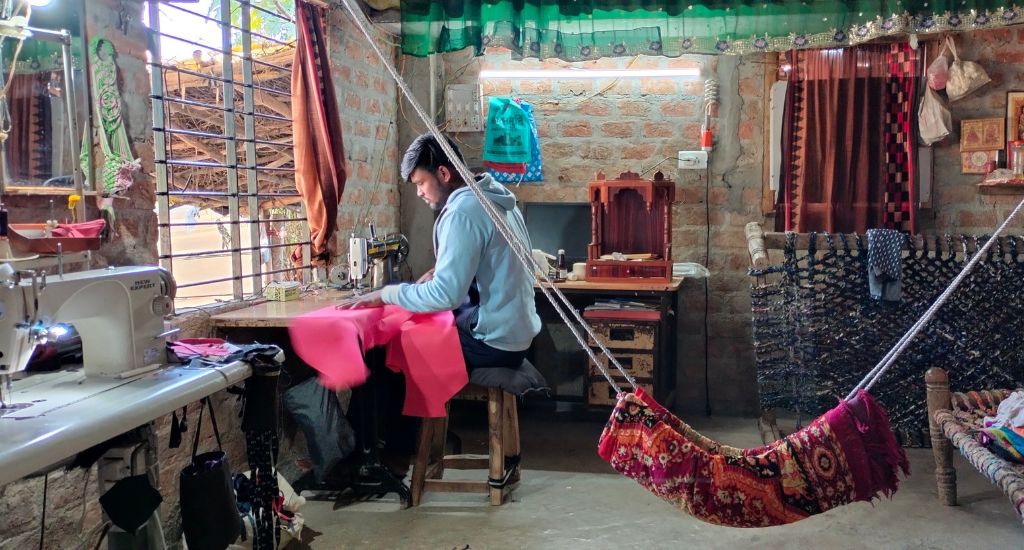
Village of coat makers
With 150 tailors and hundreds of sewing machines, Kajliban in Dewas district has built up a formidable reputation for itself as the 'coat walon ka gaanv' – village of coat makers.

With 150 tailors and hundreds of sewing machines, Kajliban in Dewas district has built up a formidable reputation for itself as the 'coat walon ka gaanv' – village of coat makers.
‘Coat walon ka gaanv’ (village of coat makers) is at the end of a long serpentine road that winds through thick growths of teak and lyptus trees in Dewas district of rural Madhya Pradesh.
It is here that the intense and constant rattling of sewing machines and the spectacle of tailors startle the visitors.
For, what Kajliban presents is a rather unusual sight.
Here, dozens of ordinary men – dressed in customary village outfits – are busy at work, stitching up dresses that are definitely not synonymous with them. Or the ones they normally do not wear.
But then, this is what is at the core of Kajliban’s novelty.
It is a village bursting at its seams with skilled tailors where almost every household has a couple of sewing machines. And they collectively stitch some 500 coats every day.

But why coats?
Well, the credit goes to two enterprising villagers who years ago went to Indore to work in a tailoring shop. The shop specialised in stitching tuxedo – a man’s dinner jacket – and the two picked up the skill.
Also Read | India’s rural youth show high interest in entrepreneurship, finds survey
But life in the city was hard, given the high living costs. And the duo returned to Kajliban after sometime. They set up their own tailoring unit, setting up a trend that spread infectiously. Others followed suit and now the entire village stitches fashionable coats.
“I guess it takes long to start something new. Once started, the flow turns into a rapid current. This is what happened in our village too,” claimed Ravi Lodhi – one of the two who originally went to Indore and then returned to light the spark for stitching coats in the village.
Today, Ravi remains Kajliban’s biggest dressmaker though scores of others have joined the trade.
Predominantly inhabited by members of the Lodhi community who traditionally were cultivators, Kajliban has transformed itself with garment dealers and store owners making a beeline for it with bulk orders.

The sewing machines are whirring with ever more ferocity this wedding season.
“We have an awful lot of work ahead of us,” said Vishal Lodhi.
The transformation of the village has meant that that coats and jackets are no more alien for residents of Kajliban. Now, even a boy as young as 14, can not only pronounce tuxedo correctly, but can also stitch one within a day.
“Things never had been easy for us. At a young age, we were obliged to take up household responsibilities. Either we had to work as daily wagers at construction sites, or we had to migrate in search of job opportunities,” explained Ravi.
Also Read | What stops rural enterprises from growth and prosperity?
It was in search of jobs that Ravi and his friend Ramprasad went to Indore. The rest is history.
In the beginning, the duo evoked little enthusiasm when they first set up shop in the village.
“I still remember how everyone laughed and made fun of us. That phase was quite bad. It was only the two of us doing this unusual job,” pointed out Ramprasad.

But then the trade caught on with others. At present Ramprasad employs 10 villagers in his tailoring venture.
The trend, however, has a downside. Most youngsters are dropping out of schools and taking up tailoring instead at a very young age.
The youngest tuxedo maker in Kajliban is just 14 years old. Women though stay away from the profession, remaining engaged with household chores and their farms.
Besides handsome profits and a decent livelihood, tuxedo making has had some other positives.
For example, it helped earn Kailash Lodhi fulsome praise when he designed and stitched his own wedding suit.
“I always wanted my suit to catch everyone’s attention. I worked very hard on making it,” he recollected proudly.
But it has taken a lot of learning for the villagers to hone their tailoring skills.
“In the beginning, we all used to waste yards of cloth material. We didn’t know about the pockets, how many to be put in a jacket or coat…outside and inside. It was confusing,” admitted Rahul Lodhi.
Now, Kajliban has come a long way in perfecting their trade. The wages for stitching a coat is Rs 300. It usually takes a little more than three hours to stitch one. Normally a tailor manages to complete four a day.

“We really have made progress. I have 20 people working with me. It is a huge place now,” said Ravi.
As coats are produced in Kajliban at a frenetic pace, its fame has spread far and wide. “It’s not only Mumbai or Delhi, but our coats even fly off to Saudi Arabia,” he added.
Also Read | Village entrepreneurship as a key to rural growth
Now, even villagers from adjacent areas are paying visits to Kajliban to learn the trade.
“My mother passed away a few months ago. I had to do something to sustain and help my father. I got here and began to learn tailoring,” said Nitesh, just 12 years old.
Everyone in the vicinity believes that Kajliban is stitching together a better future for itself, coat by coat. And no one is complaining.
The lead image shows Rahul Lodhi sewing a coat in his workshop at his farm, while his newborn daughter sleeps nearby (Photo by Pranay Tripathi)
Pranay Tripathi is an Indore-based upcoming filmmaker. He is a Rural Media Fellow 2022 at Youth Hub, Village Square.